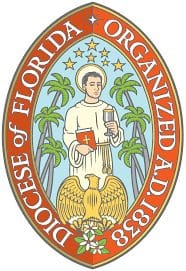As Anglican Watch predicted, a formal complaint has been lodged against the election of Charlie Holt as potential bishop of the diocese of Florida. The news follows two previous challenges, both of which threw out the election results.
Among the allegations:
- There was a material error in voting not disclosed nor discovered until after the election.
- Clergy with cure not granted residency; disparate treatment of similarly situated clergy.
- Duly elected lay delegates denied seat, voice, and vote.
- The Diocese’s own rules were not followed.
- The election process was fundamentally unfair.
the Rev. Charlie Holt was elected with the minimum number of clergy votes required but the objectors allege that at least one clergy member was recorded as voting who was not physically present, and that the convention did not have measures in place to ensure that all voters were who they claimed to be.
They further allege that the current bishop, Samuel Johnson Howard, has not accepted letter dismissory in the timeframe required by canon for clergy serving in the diocese and that he did this to limit the number of voting clergy who do not support the bishop’s conservative views.
In their other objections they claim that the rules were changed inappropriately and sometimes confusingly, and that the diocese has not been a neutral arbiter but has worked to promote the favored candidate, Charlie Holt.
Under different circumstances, Anglican Watch would urge that the Office of the Presiding Bishop step in to help all involved make peace. But the task undoubtedly would fall to Todd Ousley, and we have seen the hot mess that he has made of most church conflicts. Thus, we fear adding insult to injury.
Beyond that, we urge all involved to take a deep breath, slow down, assume good intent, and consider whether the Lombard Mennonite Peace Center (yes, we’re fans) or other independent third party might help work towards health and wholeness. We reiterate: The ultimate goal should not be to elect a bishop. It should be the well-being of the diocese. And we are seeing some strongly entrenched positions on the matter across the spectrum, typically based less on evidence and more on “parking lot conversations.”
Indeed, the old joke holds true: four Episcopalians, five opinions.
In short, this is not a situation that is going to be resolved absence outside assistance.


Some of these objections are things like “We feel we should have more delegates but our ASA is too low!” “I think I should be able to vote but I don’t have canonical residency!”
These accusations can be cleared up with simple to confirm documentation like letters of transfer of canonical residency or Sunday attendance registers. If not, it will be the objectors who need to atone for the discord they’ve cause the diocese.
The problem here is that Anglican Watch is unwilling to accept the possibility that it’s the objectors introducing discord in this process, not the diocese or Fr Holt. Giving the objectors what they want would be unfair to the people who voted for Fr. Holt.
Actually, the problem is those, including you, who are unwilling to listen. What we are saying is that the diocese has a much larger issue than the election, and that is trust.
Imagine if a parishioner comes to you and says, “I need to get a divorce. My husband is emotionally abusive.”
The appropriate pastoral response is to listen carefully, verify that the parishioner is not in imminent physical danger, then encourage him/her to get professional counseling to see if a rupture can be avoided.
Your response in the case of your diocese boils down to, “I’ve heard all I need to hear and my mind is made up. Get over it.”
If the diocese continues to follow your approach, it won’t matter who you get as a bishop. Instead, you will be dealing with a major rift in the Body of Christ. And that is contrary to your ordination vows.